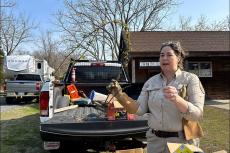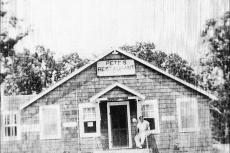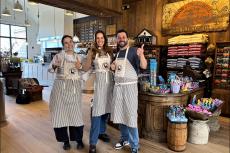An environmental remediation project designed in part to showcase sound and sustainable landscaping practices is taking shape in East Hampton Village.
Passers-by have likely noticed the bioswale and growing landscaping on village-owned land along Methodist Lane, a veritable meadow of trees, plants, and grasses native to Long Island. The Methodist Lane bioswale, a drainage course with gently sloped sides, is planted with vegetation designed to absorb road runoff, filter pollution from stormwater, and provide native habitat while beautifying a public space.
Like the bioswale watercourse on the village green that was planted in 2016, the Methodist Lane bioswale is in the Hook Pond watershed. Hook Pond has had harmful algal blooms, a result of excessive nitrogen and phosphorus from septic systems and stormwater runoff, as well as from wildlife. The Methodist Lane bioswale and garden project is intended to improve the water quality of Hook Pond, while the village green bioswale benefits both Hook Pond and the recently dredged Town Pond. Both projects, ultimately, benefit the Atlantic Ocean.
Planting was to be completed Wednesday, when students from the East Hampton Middle School's Surfrider Club undertook a volunteer day, an early example of the project's intended educational component. It is important to "train young eyes to a new accepted standard for beauty," said Tony Piazza of Piazza Horticultural in Southampton, who designed the native garden with input on preferred native species from members of the Garden Club of East Hampton.
In installing the bioswale and rain garden, "we reduced a highly maintained lawn that has huge water and fertilizer requirements," Mr. Piazza said, "and installed native plants that require no irrigation or fertilization and offer an amazing amount of wildlife service."
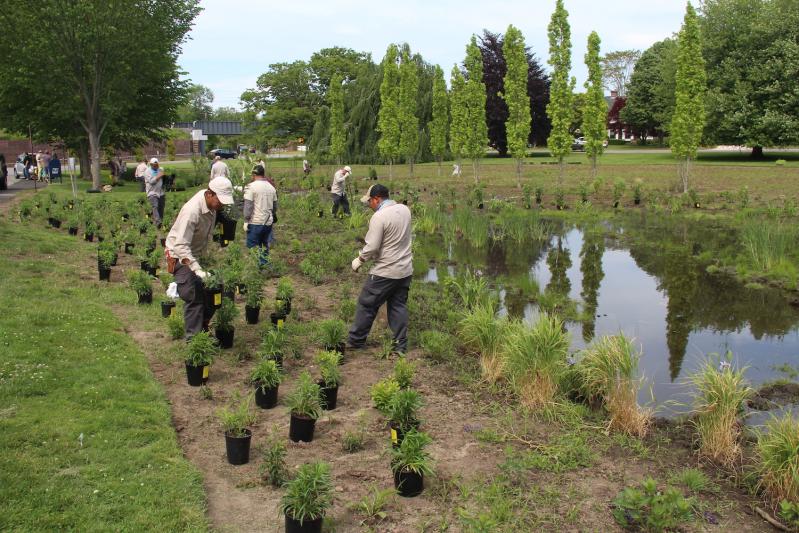
The Methodist Lane bioswale and garden represent a partnership among Piazza Horticultural, the Surfrider Foundation's eastern Long Island chapter, the Ladies Village Improvement Society, Mahoney Farm in East Hampton, the Garden Club, and the Suffolk County Soil and Water Conservation District. It was made possible by East Hampton Town's $127,000 grant from the community preservation fund, following the Surfrider Foundation's 2020 application for funding, as well as by private donors. The grant was awarded on the recommendation of the town's water quality technical advisory committee to allocate the money toward the project's $200,000 price tag.
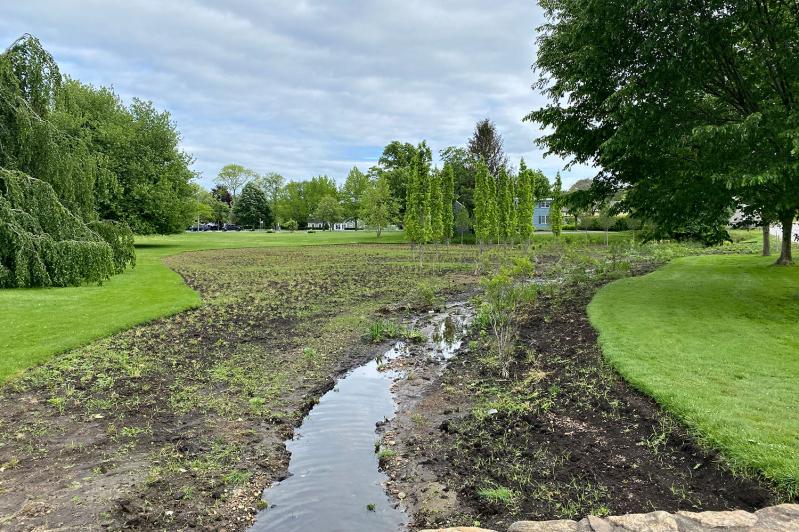
The project comprises a native grass meadow, wetland plantings, and a pollinator garden. Purple lovegrass, little bluestem, butterfly weed, false indigo, and 24 sweet gum and black gum trees are among the species in the meadow. Wetland plants include hibiscus, fringed sedge and bristly sedge, marsh marigold, and switchgrass. The pollinator garden has black-eyed Susan, ironweed, seaside goldenrod, blue verbena, and wild geranium.
"We're hoping that, being that it represents these ecosystems, it could be a sort of laboratory for the schools and different clubs, for educational purposes," Mr. Piazza said.
Flowers are starting to bloom, and the volume of stormwater and road runoff that had passed through the bioswale was apparent on Monday, when the Memorial Day weekend rains had finally ceased. A few ducks splashed in the collected water, but the bucolic scene was dotted with debris wrapped around just-planted flora, demonstrating both the volume of water moving through the bioswale and the impact of littering on land and water alike.
"We're really excited to see how it grows in this year, and how it's able to address the amount of runoff on that site," Mara Dias, the Surfrider Foundation's water quality manager, said. "Obviously, a lot of water moved through there this weekend."
The bioswale conforms with the Surfrider Foundation's Ocean Friendly Gardens program, which aims to connect landscaping and other land practices with their effect on waterways. Applying chemical fertilizers and pesticides to lawns and using too much water are "killing all the beneficial biology in our soils that support beautiful and healthy plants" while also creating polluted runoff, according to the foundation.
The village green bioswale, another Ocean Friendly Gardens project, has been "wildly successful" on multiple levels, Mr. Piazza said, which the Methodist Lane project should replicate and amplify. "The public awareness part was huge," he said, "because people started asking questions. We were able to explain water quality issues, and then, from a planting standpoint, it's been super-successful because some plants are at a point where we have to thin them out. They're self-sowing and propagating like crazy."
"From Surfrider's perspective, we want to advocate for less monoculture lawns, and for incorporating natives into lawns," Ms. Dias said. "You don't need all the chemicals, all the extra water."


